

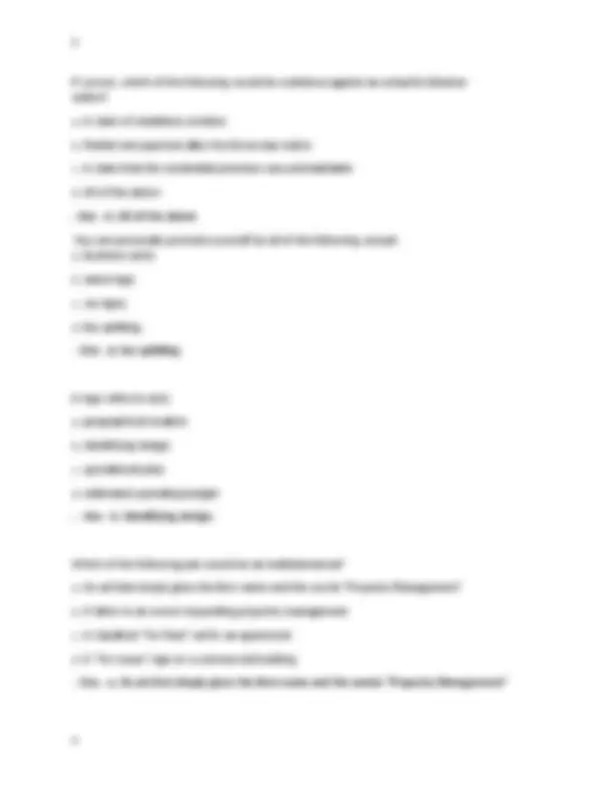
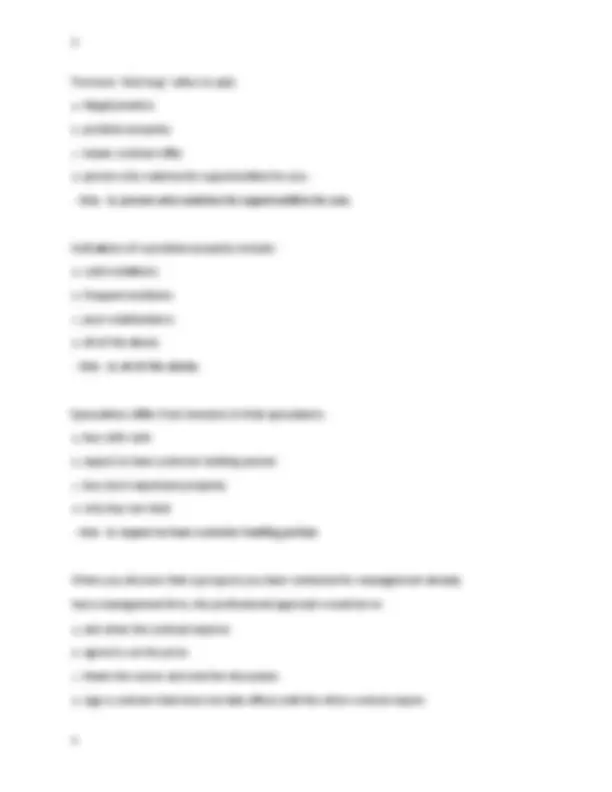

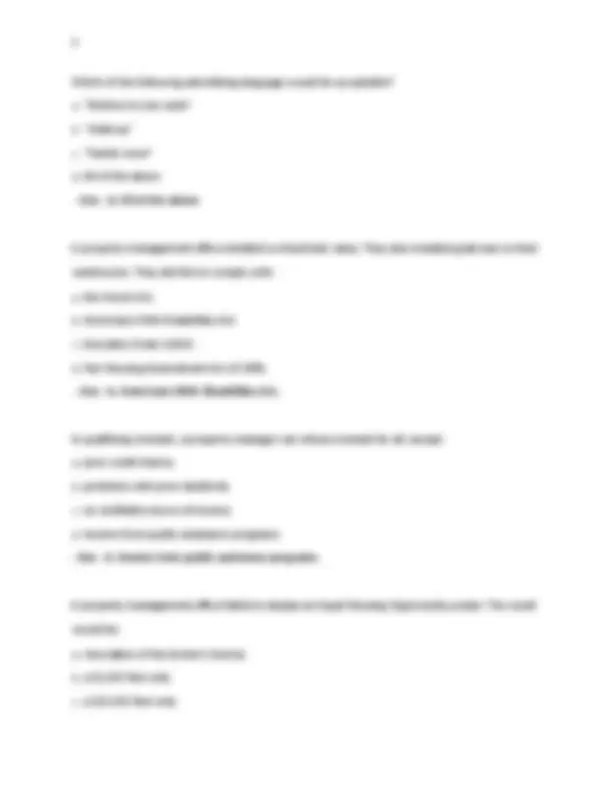
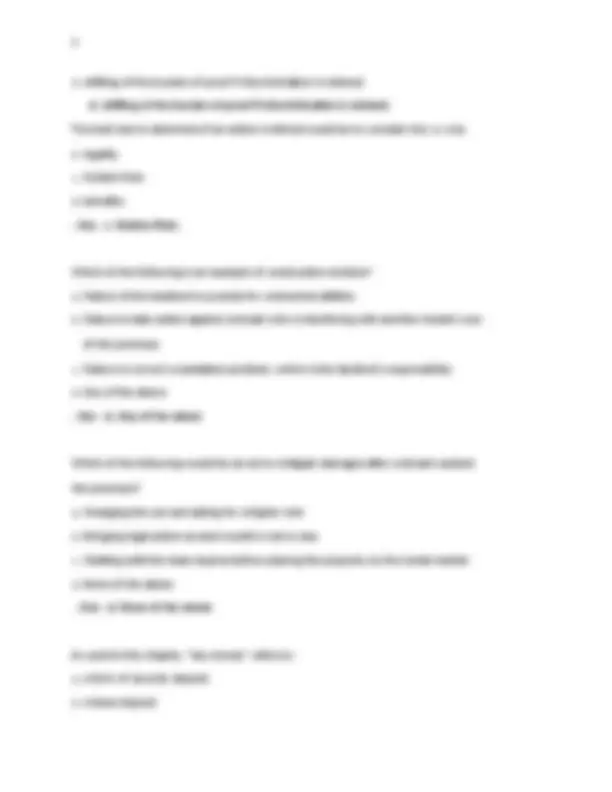
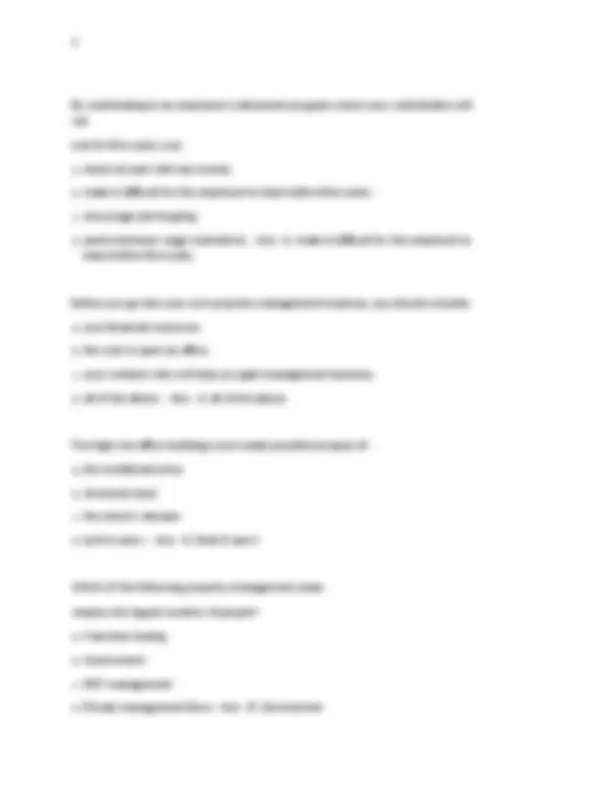
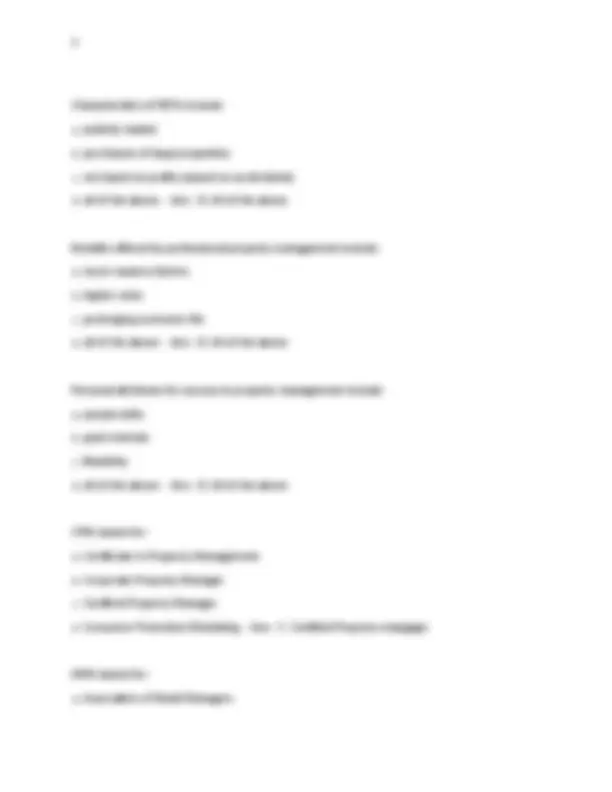
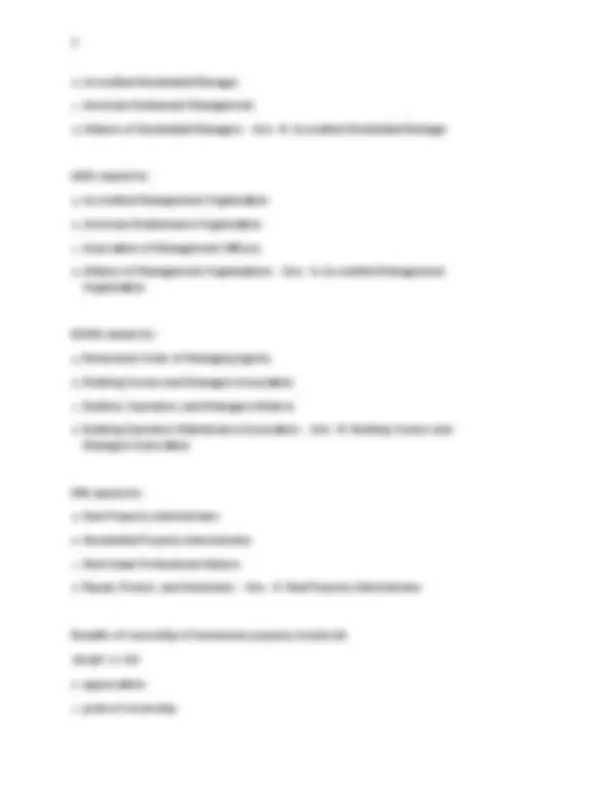
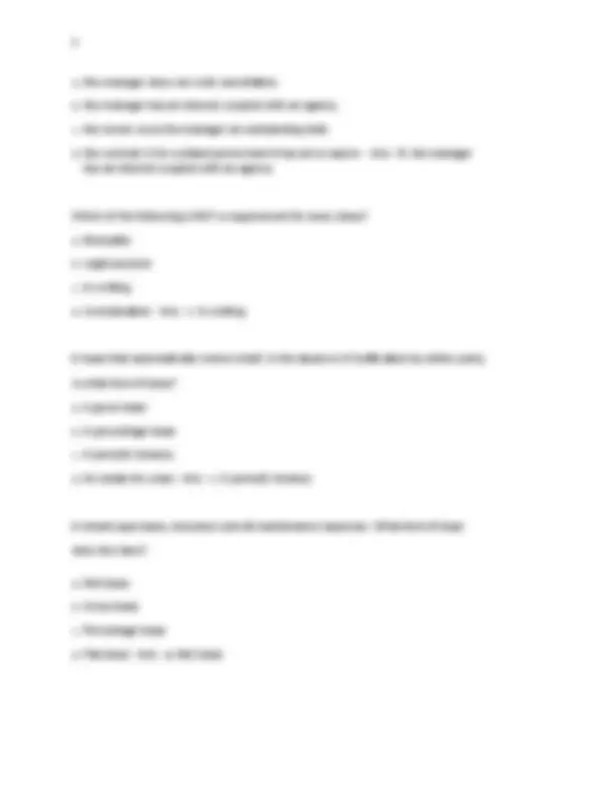
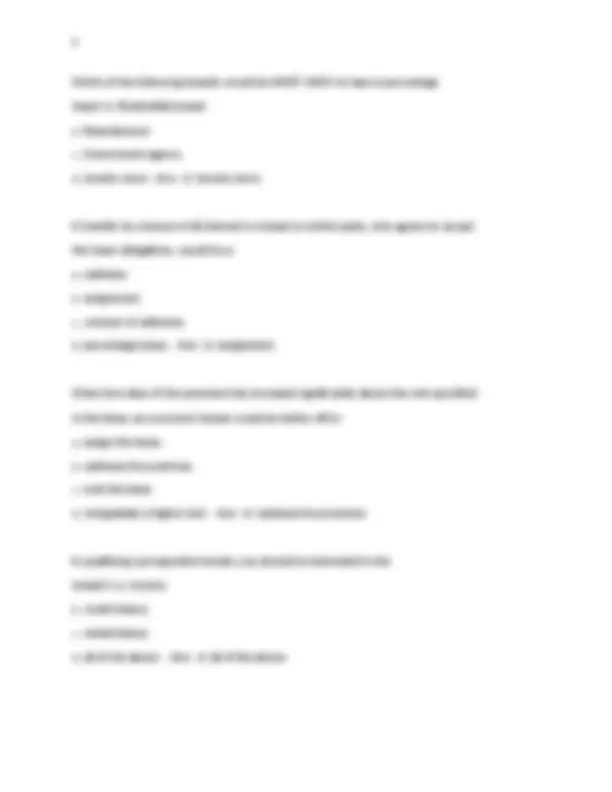

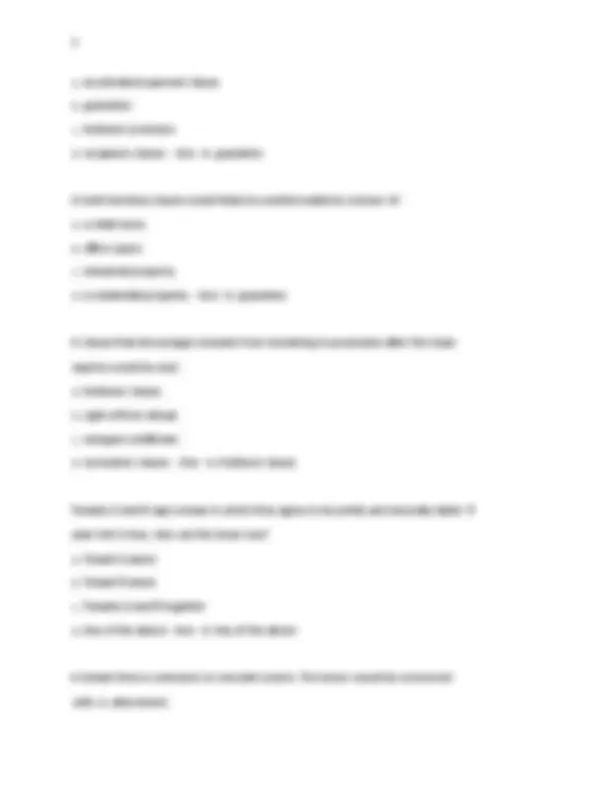
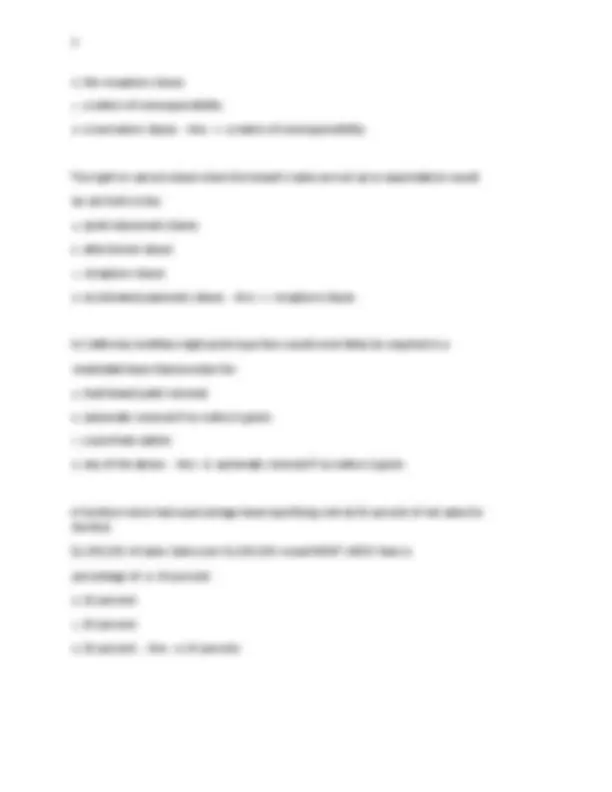
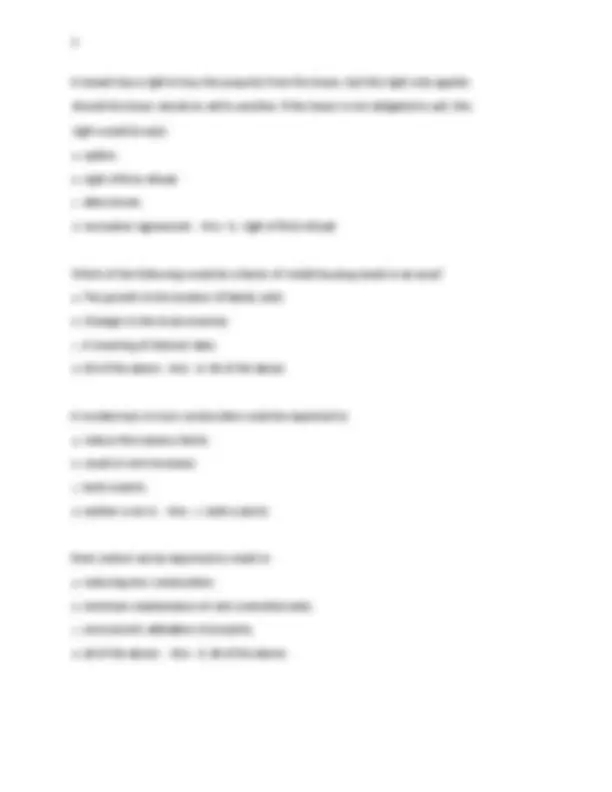
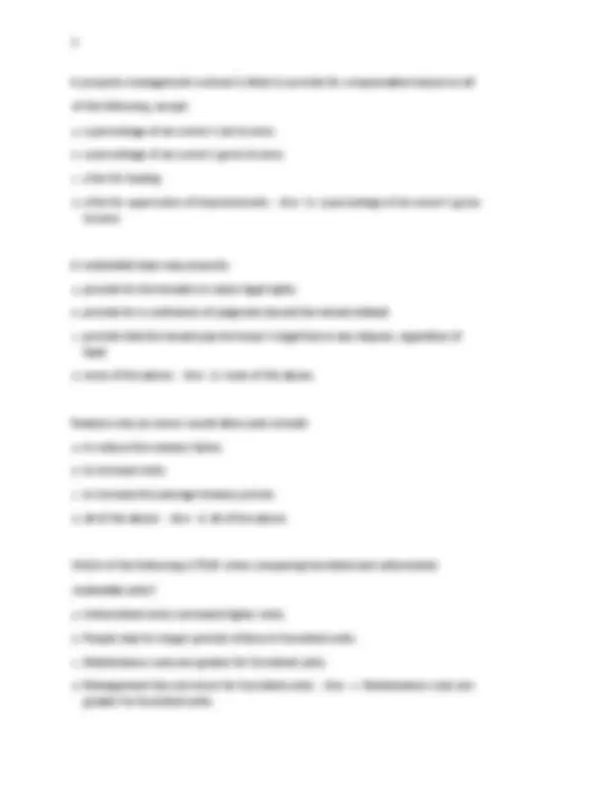
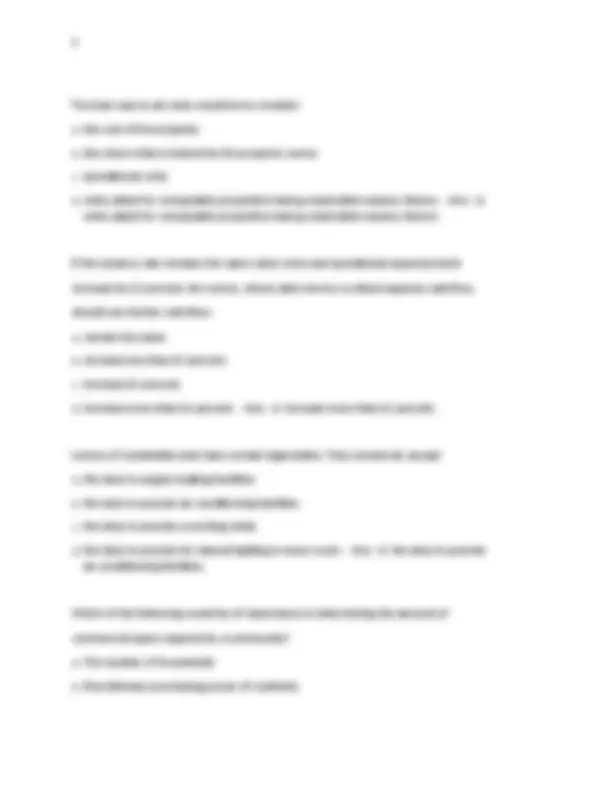
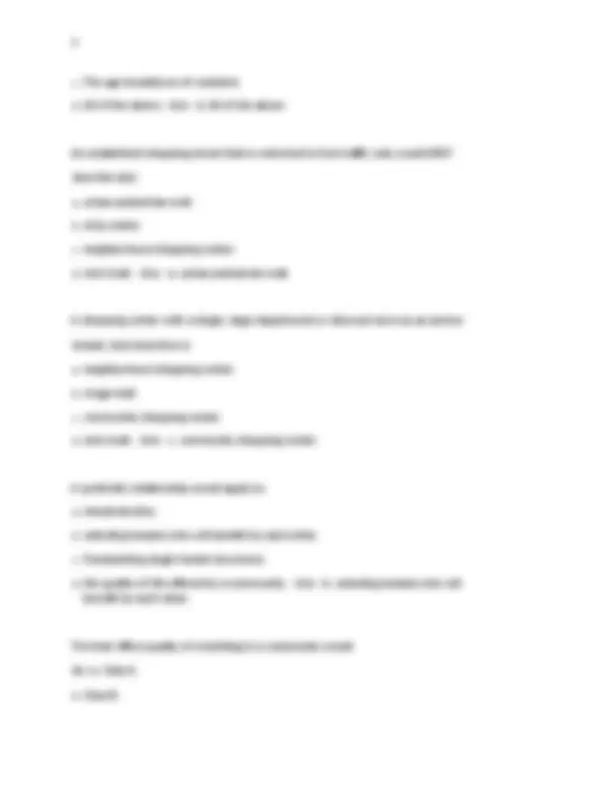
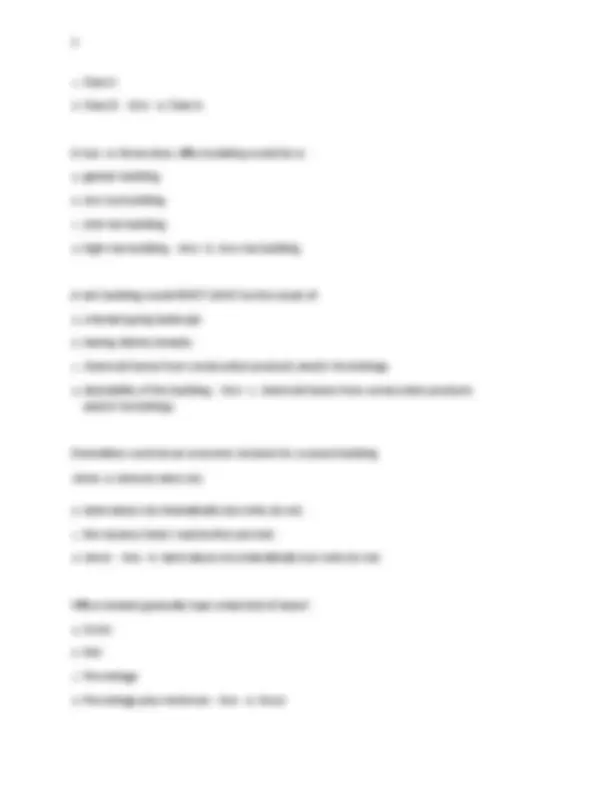
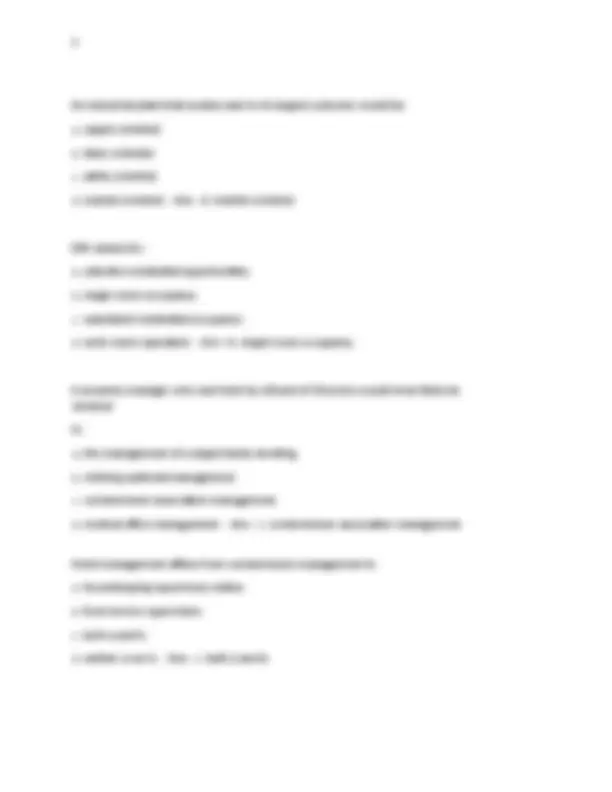
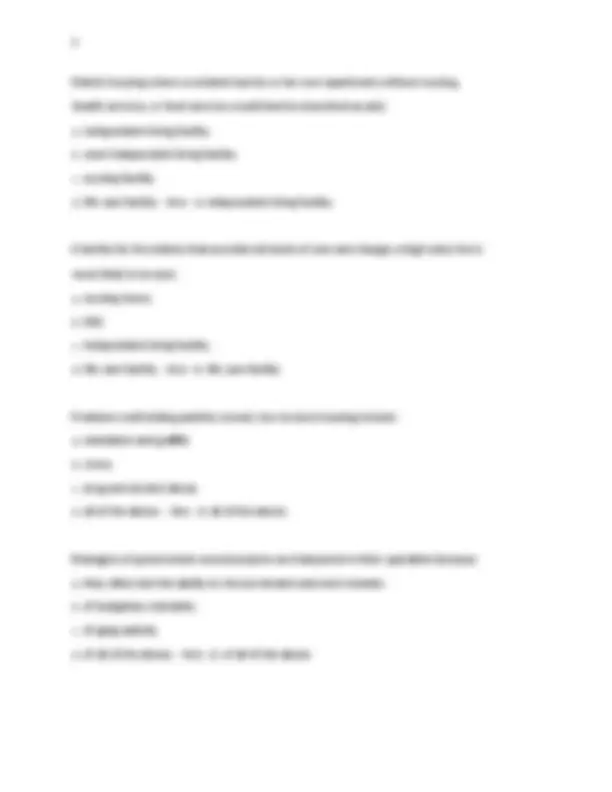
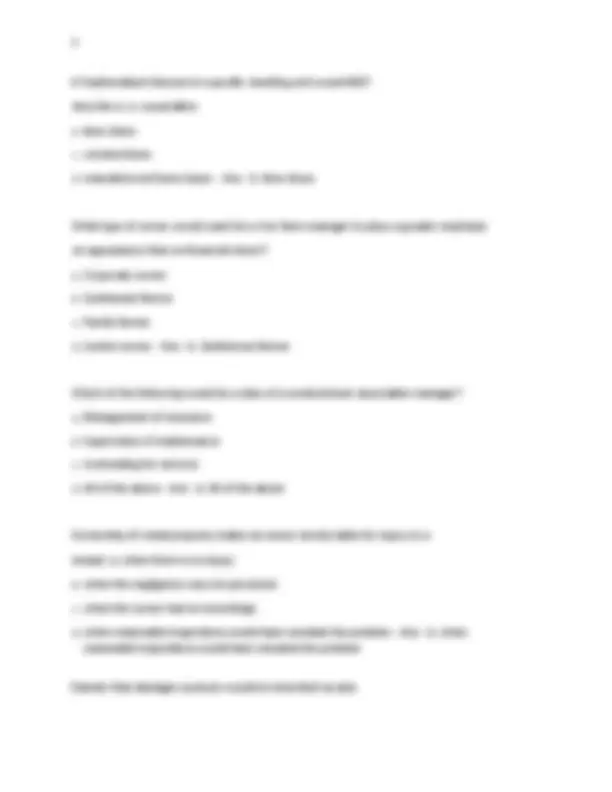
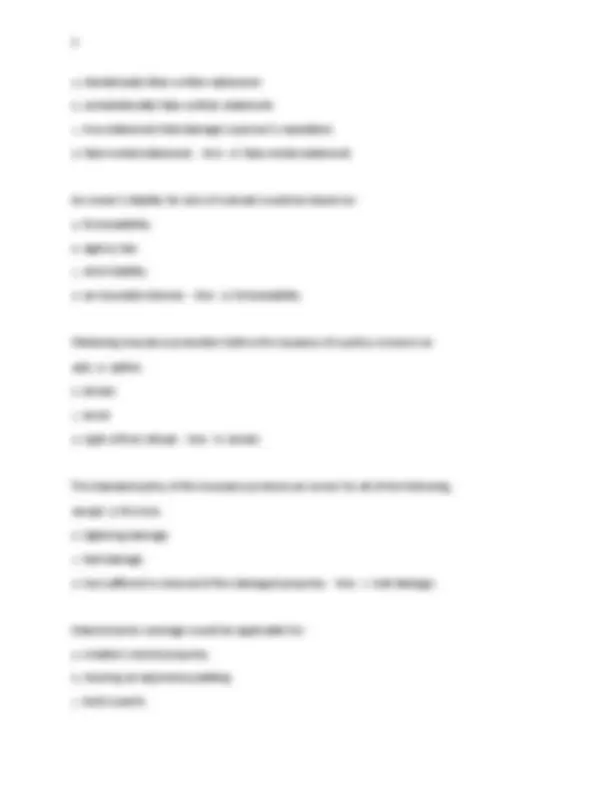
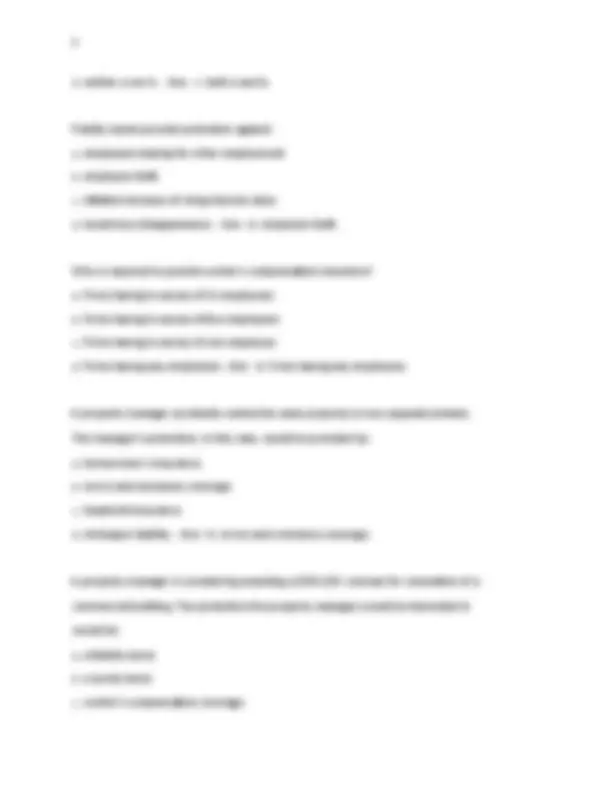
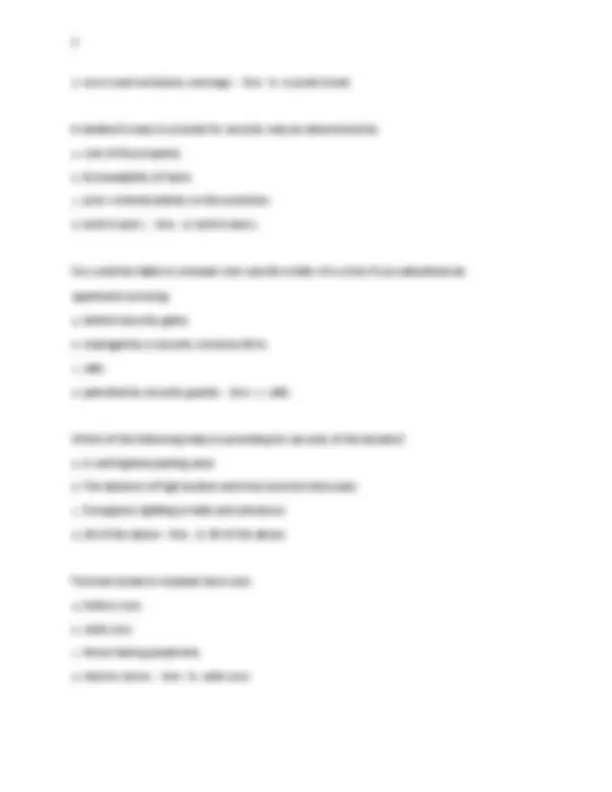
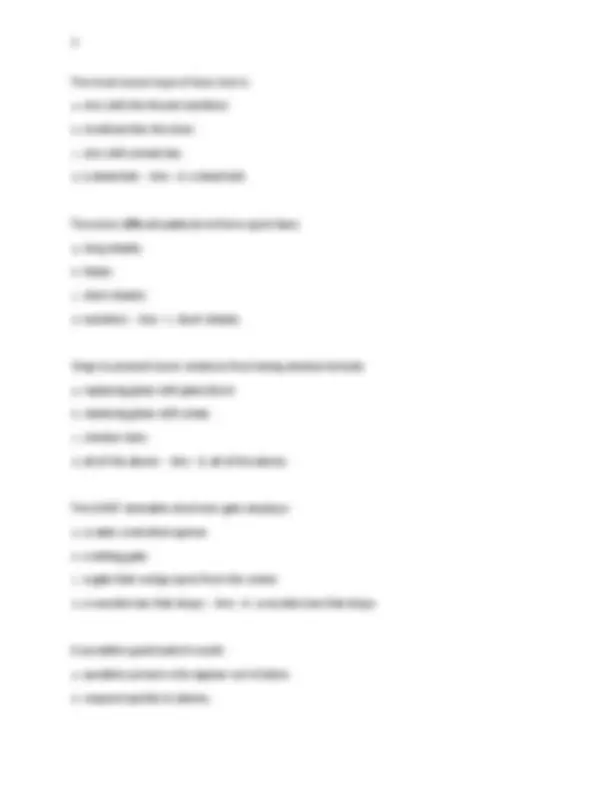
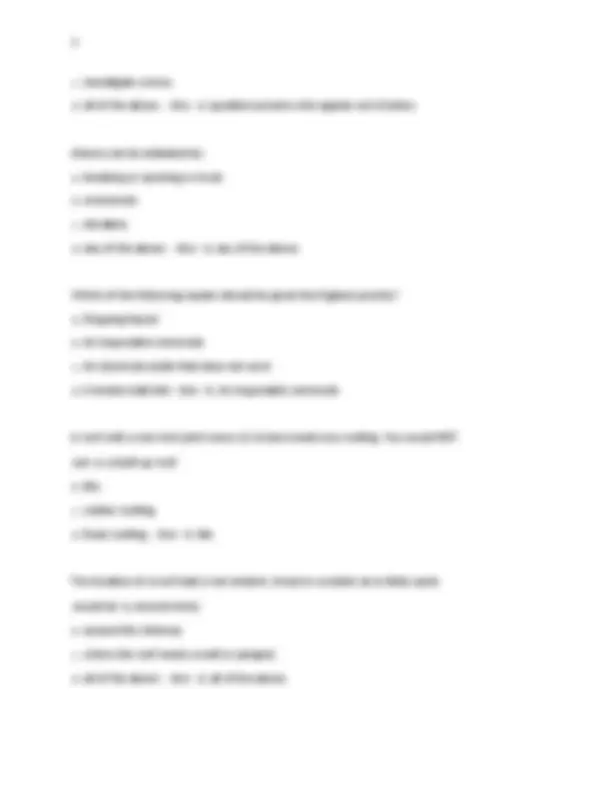
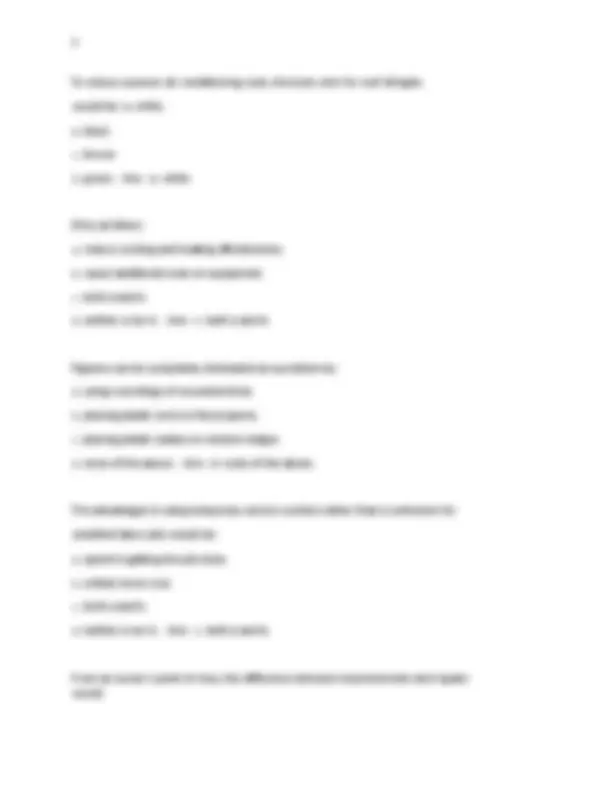
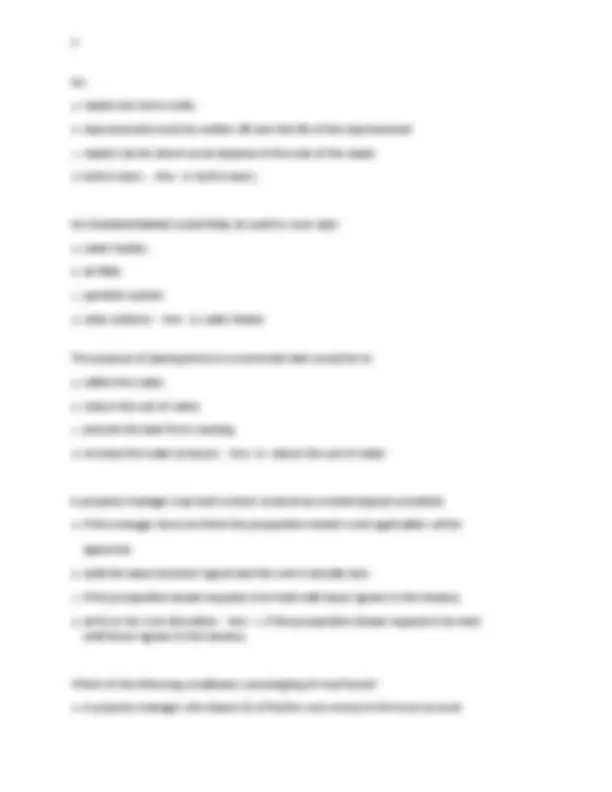
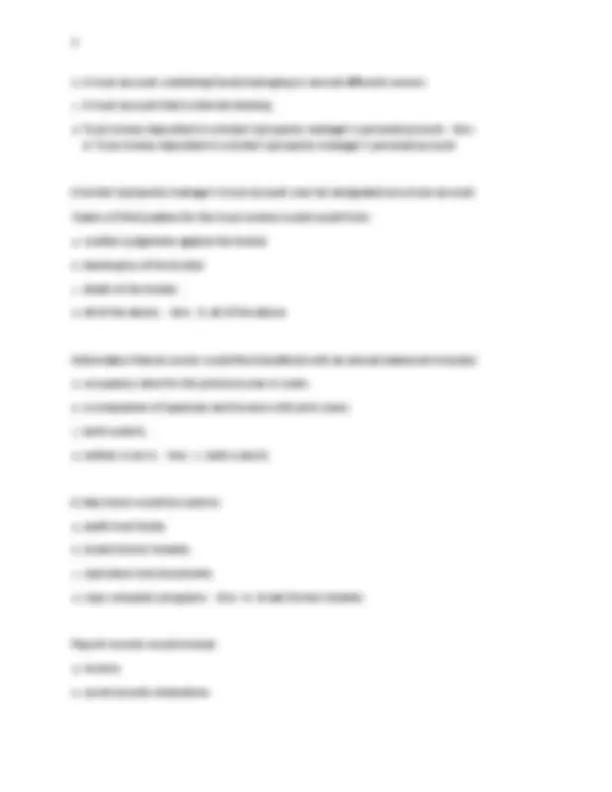



Study with the several resources on Docsity

Earn points by helping other students or get them with a premium plan


Prepare for your exams
Study with the several resources on Docsity

Earn points to download
Earn points by helping other students or get them with a premium plan
Community
Ask the community for help and clear up your study doubts
Discover the best universities in your country according to Docsity users
Free resources
Download our free guides on studying techniques, anxiety management strategies, and thesis advice from Docsity tutors
Which of the following is true about a lease "surrender" when one year is remaining on the lease? a. The tenant is liable for one month's rent. b. The tenant is not liable for the remaining rent. c. The landlord must mitigate damages. d. The tenant is immediately liable for total rent to the end of the lease. - Ans - b. The tenant is not liable for the remaining rent. As a property manager, it is NOT good business practice to lease to: a. close relatives. b. close friends. c. a person with whom you are romantically involved. d. any of the above. - Ans - d. any of the above. In handling a tenant waiting list, you should give preference to: a. friends. b. women. c. families with children. d. time and date of application. d. time and date of application. Fiduciary duty of a property manager to a property owner includes: a. loyalty. b. confidentiality. c. full disclosure. d. all of the above - Ans - d. all of the above
Typology: Exams
1 / 39

This page cannot be seen from the preview
Don't miss anything!
































4
Which of the following is true about a lease "surrender" when one year is remaining on the lease? a. The tenant is liable for one month's rent. b. The tenant is not liable for the remaining rent. c. The landlord must mitigate damages. d. The tenant is immediately liable for total rent to the end of the lease.
- Ans - b. The tenant is not liable for the remaining rent. As a property manager, it is NOT good business practice to lease to: a. close relatives. b. close friends. c. a person with whom you are romantically involved. d. any of the above. - Ans - d. any of the above. In handling a tenant waiting list, you should give preference to:
4 a. friends. b. women. c. families with children. d. time and date of application. d. time and date of application. Fiduciary duty of a property manager to a property owner includes: a. loyalty. b. confidentiality. c. full disclosure. d. all of the above
- Ans - d. all of the above Tenant "waste" refers to: a. inefficient management. b. a high tenant turnover. c. tenant abuse of the property. d. the failure to conserve energy. - Ans - c. tenant abuse of the property. A tenant signed a one-year lease and failed to take possession. The maximum tenant obligation would be: a. one month's rent. b. 30 day's rent. c. rent for one year. d. none of the above. - Ans - c. rent for one year.
4 If correct, which of the following would be a defense against an unlawful detainer action? a. A claim of retaliatory eviction b. Partial rent payment after the three-day notice c. A claim that the residential premises was uninhabitable d. All of the above
- Ans - d. All of the above You can personally promote yourself by all of the following, except: a. business cards. b. name tags. c. car signs. d. fee splitting. - Ans - d. fee splitting. A logo refers to a(n): a. geographical location. b. identifying design. c. operational plan. d. estimated operating budget . - Ans - b. identifying design. Which of the following ads would be an institutional ad? a. An ad that simply gives the firm name and the words "Property Management" b. A letter to an owner requesting property management c. A classified "For Rent" ad for an apartment d. A "For Lease" sign on a commercial building - Ans - a. An ad that simply gives the firm name and the words "Property Management"
4 The term "bird dog" refers to a(n): a. illegal practice. b. problem property. c. teaser contract offer. d. person who watches for opportunities for you.
- Ans - d. person who watches for opportunities for you. Indications of a problem property include: a. code violations. b. frequent evictions. c. poor maintenance. d. all of the above. - Ans - d. all of the above. Speculators differ from investors in that speculators: a. buy with cash. b. expect to have a shorter holding period. c. buy more expensive property. d. only buy raw land. - Ans - b. expect to have a shorter holding period. When you discover that a prospect you have contacted for management already has a management firm, the professional approach would be to: a. ask when the contract expires. b. agree to cut the price. c. thank the owner and end the discussion. d. sign a contract that does not take effect until the other contract expire
4 d. 1988.
- Ans - a. 1866. Directing a prospective tenant away from a property because you did not feel that he/she would be comfortable there based on the race of the current residents would be: a. blockbusting. b. steering. c. redlining. d. legal. - Ans - b. steering. Which of the following is NOT be a member of a protected group under the 1988 Fair Housing Amendment Act? a. A blind person b. A person with AIDS c. A drug addict d. An alcoholic - Ans - c. A drug addict A tenant has a seeing eye dog. The lessor can: a. charge an increased rent because of the pet. b. increase the security deposit to cover possible damage by the dog. c. refuse to rent to the person if there is a no-pet policy that is uniformly enforced. d. do none of the above. - Ans - d. do none of the above. An exception to the prohibition against discrimination as to familial status would be:
4 a. children under the age of 18. b. a prospective tenant who is pregnant. c. housing for the elderly. d. an unmarried mother
. - Ans - c. housing for the elderly.
d. shifting of the burden of proof if discrimination is claimed. d. shifting of the burden of proof if discrimination is claimed. The best test to determine if an action is ethical would be to consider the: a. cost. b. legality. c. Golden Rule. d. benefits.
- Ans - c. Golden Rule. Which of the following is an example of constructive eviction? a. Failure of the landlord to provide for contracted utilities b. Failure to take action against a tenant who is interfering with another tenant's use of the premises c. Failure to correct a sanitation problem, which is the landlord's responsibility d. Any of the above - Ans - d. Any of the above Which of the following would be an act to mitigate damages after a tenant vacated the premises? a. Changing the use and asking for a higher rent b. Bringing legal action as each month's rent is due c. Waiting until the lease expires before placing the property on the rental market d. None of the above - Ans - d. None of the above As used in this chapter, "key money" refers to: a. a form of security deposit. b. a lease deposit.
c. a payment to be given occupancy. d. none of the above.
- Ans - c. a payment to be given occupancy. Management costs per unit managed: a. increase as the number of units increase. b. decrease as the number of units increase. c. decrease as the number of units decrease. d. are not related to the number of units. - Ans - b. decrease as the number of units increase. As to management and leasing fees, which of the following is a true statement? a. Larger complexes would probably have a lower percentage of the gross as management fees. b. Below-normal management fees could be compensated for with higher leasing fees. c. When the owner pays for advertising costs, leasing fees will probably be lower. d. All of the above. - Ans - d. All of the above. A resident manager lives in the complex she manages but does not pay any rent. Which of the following is true? a. If he/she is not required to live there, the value of the apartment counts as wages. b. If he/she is required to live there, the apartment value does not count as wages. c. Both a and b. d. Neither a nor b. - Ans - c. Both a and b.
By contributing to an employee's retirement program where your contribution will not vest for five years, you: a. need not part with any money. b. make it difficult for the employee to leave before five years. c. encourage job-hopping. d. avoid minimum wage restrictions. - Ans - b. make it difficult for the employee to leave before five years. Before you go into your own property management business, you should consider: a. your financial resources. b. the cost to open an office. c. your contacts who will help you gain management business. d. all of the above. - Ans - d. all of the above. The high-rise office buildings were made possible because of: a. the moldboard plow. b. structural steel. c. the electric elevator. d. both b and c. - Ans - D: Both B and C Which of the following property management areas employ the largest number of people? a. Franchise leasing b. Government c. REIT management d. Private management firms - Ans - B: Government
Characteristics of REITs include: a. publicly traded. b. purchasers of large properties. c. not taxed on profits passed on as dividends. d. all of the above. - Ans - D: All of the above Benefits offered by professional property management include: a. lower vacancy factors. b. higher rents. c. prolonging economic life. d. all of the above. - Ans - D: All of the above Personal attributes for success in property management include: a. people skills. b. goal oriented. c. flexibility. d. all of the above. - Ans - D: All of the above CPM stands for: a. Certificate in Property Management. b. Corporate Property Manager. c. Certified Property Manager. d. Consumer Protection Marketing. - Ans - C: Certified Property mangager ARM stands for: a. Association of Retail Managers.
d. capital gains tax on sale profits. - Ans - A: Risk A property analysis included in a management plan would cover: a. the locational advantages and disadvantages of the property. b. the physical structure. c. current tenants and rents. d. all of the above. - Ans - D: All of the above What is a Pro-Forma Statement? a. The current rent schedule b. An audited operating statement c. A statement as to anticipated rents and expenses d. A chart showing the changes in vacancies - Ans - C: A statement as to anticipated rents and expenses Zero-based budgeting is based on: a. no expenses for maintenance. b. 100 percent occupancy. c. starting with zero and justifying every budgeted item. d. anticipated revenue equaling anticipated expenses. - Ans - C: starting with zero and justifying every budgeted item. A property manager should consider refusal of management when: a. the manager lacks the expertise to properly handle management. b. the owner refuses to allow the manager to take any action without prior approval. c. the owner wants the manager to avoid making repairs. d. for all of the above situations. - Ans - D: for all of the above situations.
A slumlord wants: a. maximum rents with minimum tenant services. b. minimum rents and minimum tenant services. c. maintenance to take precedence over revenue. d. the manager to think in terms of long-term benefits of properly maintaining property. - Ans - A: maximum rents with minimum tenant services. Negative cash flow management involves: a. tax free income. b. continued infusion of cash by the owner. c. unreported cash income. d. preparing records showing cash expenses that were not actually paid. - Ans - B: continued infusion of cash by the owner. The length of a management contract should: a. never be less than five years. b. be under one year. c. ideally be on a month-to-month basis. d. be related to problems to be corrected and services to be provided. - Ans - D: be related to problems to be corrected and services to be provided. A management contract can be terminated because of: a. bankruptcy of either party. b. mutual agreement between owner and manager. c. impossibility of performance. d. any of the above. - Ans - D: any of the above. A management contract cannot be unilaterally canceled by an owner when:
Which of the following tenants would be MOST LIKELY to have a percentage lease? a. Residential tenant b. Manufacturer c. Government agency d. Jewelry store - Ans - d: Jewelry store A transfer by a lessee of all interest in a lease to a third party, who agrees to accept the lease obligations, would be a: a. sublease. b. assignment. c. contract of adhesion. d. percentage lease. - Ans - b: assignment. When the value of the premises has increased significantly above the rent specified in the lease, an economic tenant would be better off to: a. assign the lease. b. sublease the premises. c. void the lease. d. renegotiate a higher rent. - Ans - b: sublease the premises. In qualifying a prospective tenant, you should be interested in the tenant's: a. income. b. credit history. c. rental history. d. all of the above. - Ans - d: all of the above.
If you believe that rents will increase significantly in the near future, the leases you negotiate for owners, should: a. prohibit assignment. b. be for relatively short terms. c. include renewal options. d. be estates for years. - Ans - b: be for relatively short terms. Rent incentives are most likely to be given when: a. there is low unemployment. b. the rent is set below-market rent. c. there is a high vacancy factor. d. the tenant only marginally qualifies. - Ans - c: there is a high vacancy factor. When is a lessor most likely to successfully obtain an above-market rent? a. When giving rent incentives b. When negotiating a lease renewal c. Both a and b d. Neither a nor b - Ans - c: Both a and b A purchaser of a commercial building would want the tenant to furnish a(n): a. estoppel certificate. b. notice of nonresponsibility. c. right of first refusal. d. lead-based paint disclosure. - Ans - a. estoppel certificate. When a prospective tenant has had credit problems, a lessor is MOST LIKELY to request a(n):